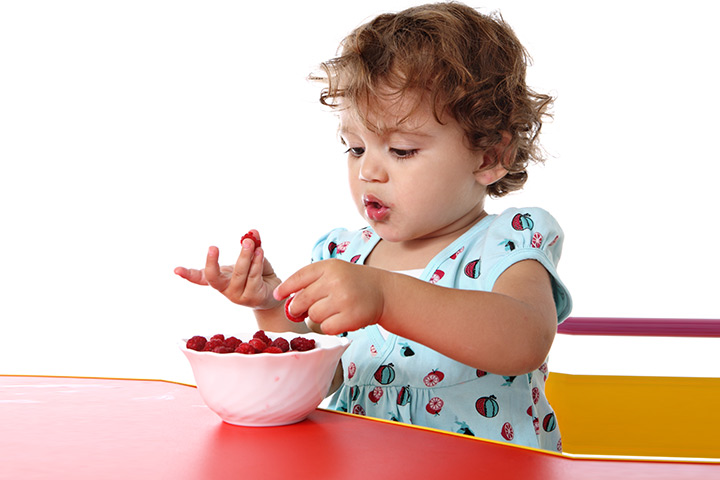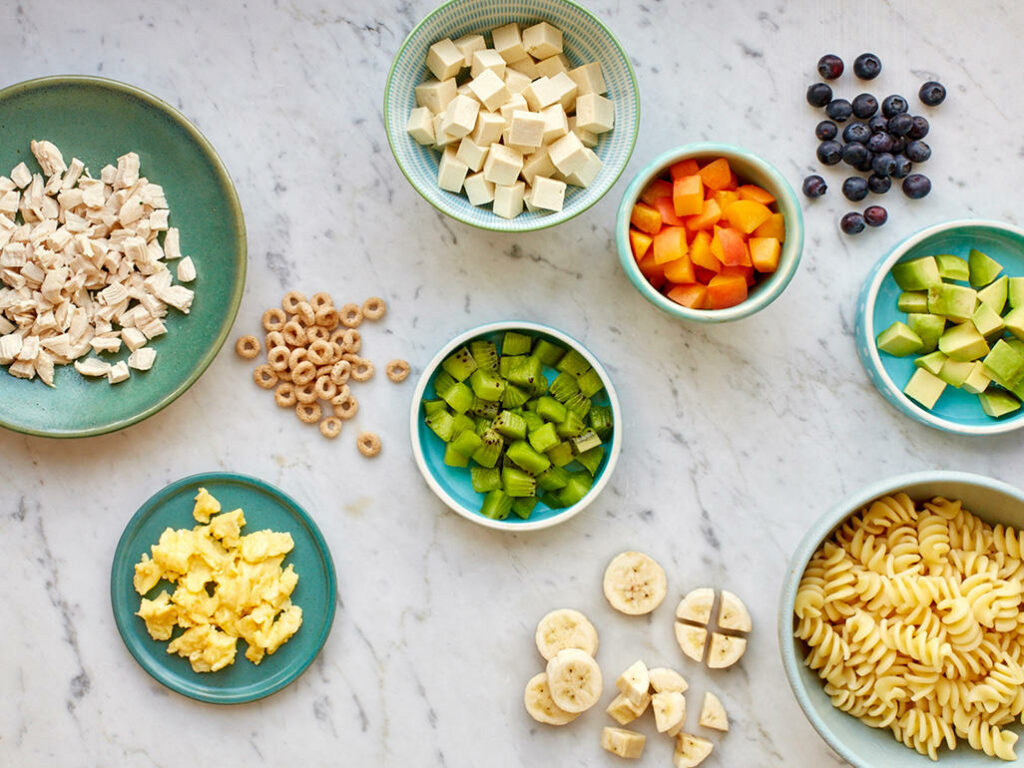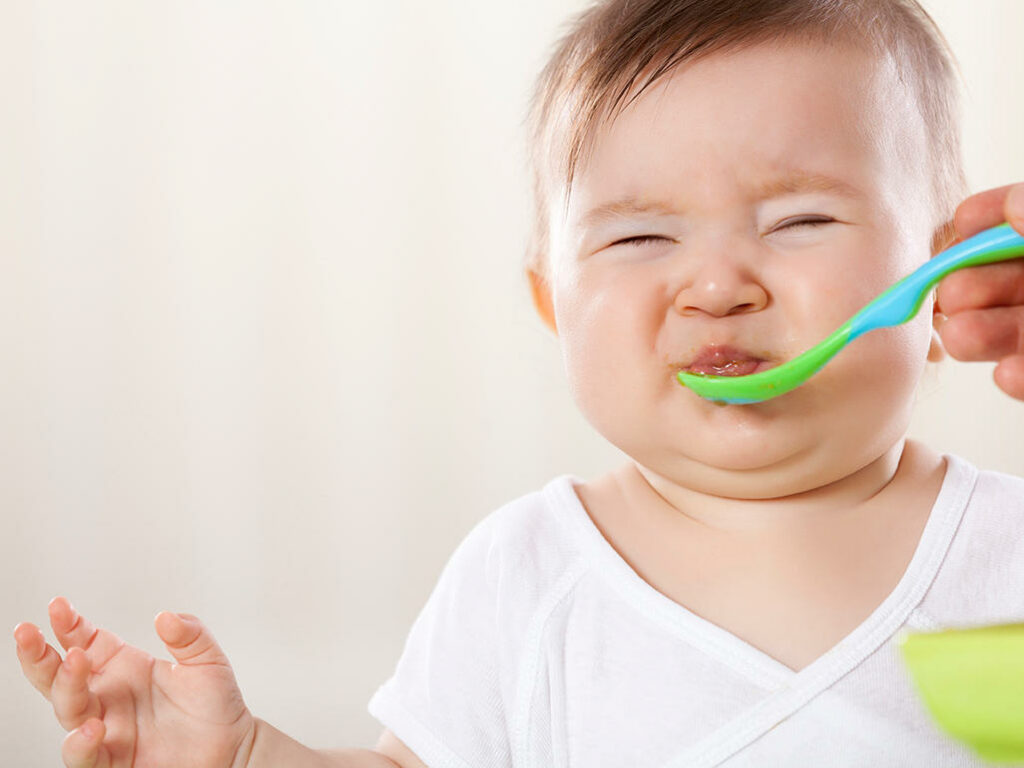As your baby enters the 8–12 month age bracket, as a mother, you only think of one question: “How to put him in the habit of consuming proper meals?”.
It is imperative to stir up new versions of your existing dishes or cook a brand-new dish in order to work up your baby’s appetite. So in this article, we’ll share some menus, recipes and ideas with all the mothers out there.
Let’s dive in and discover the world of baby food!
What Can My 11-Month-Old Baby Eat?
By the age of 11 months, your baby can consume various types of solids. It can be vegetables, fruits, poultry and dairy products, and meat. So basically, whatever you cook at home – you can feed that to your child to ensure that he receives maximum nourishment.
However, there are certain things you must look out for. You should avoid unpasteurized dairy products, citrus fruits, undercooked eggs, raw fish, honey or cow’s milk for your baby. And here’s why:
- Citrus fruits – some of them can cause allergic reactions.
- Undercooked eggs can cause salmonella infection, i.e. diarrhoea, fever and muscular cramps.
- Honey contains clostridium botulinum that can cause botulism.
And the list goes on. Therefore, you should be very cautious when selecting food items for your baby.
What Should Be My Baby’s Eating Routine?
Well, that’s a tricky question for all the mothers.
How much should my baby eat? How many snacks should he eat in a day? Should I continue breastfeeding him or not? These are some of the most common questions mums come across, and many cannot find a correct answer. However, we have tried to provide you with a food plan that you should be following every day to make sure that your baby is receiving the required amount of nutrition:
- Morning Formula or Breast Milk
- Breakfast
- Snack
- Lunch
- Evening Snack
- Dinner
- Night Formula or Breast Milk
If you follow this pattern, your baby will eventually fall into this habit, and his hunger centres will activate as the time approaches. Therefore, it is vital to get your baby in a routine so that you don’t complain about him not eating food.
What Measurements Should I Follow for My Baby?
When you’re starting with solids, it is better to know the accurate measurements beforehand. Because that way, you wouldn’t have to worry about how much your baby should eat every day. Some of the measurements are:
- Vegetables: ½ to ¼ cup
- Proteins: Up to 4 tablespoons
- Cereals: ½ to ¼ cup
- Fruits: ½ to ¼ cup
- Dairy: Up to 3 tablespoons
What’s On the Menu?
Another trick to get your baby to like solids is to make sure you’re alternating the dishes. For example, you could give him the fruit porridge for Monday’s breakfast and not repeat it until the following week.
If you bring variety to the table, not only will you be developing your baby’s taste buds, but he will also be willing to try out the dishes. On the other hand, keeping everything monotonous would eventually make your baby reluctant to eat.
Breakfast
Breakfast is indeed the most critical part of the day, and you should make sure to load up your baby with maximum energy. Now, it doesn’t mean that you have to stuff him with a lot of food – no. If you do this, your baby will not develop a liking for food. Instead, you should try your best to include nutritious and delicious foods in the breakfast.
Following are some of the foods that can prove to be a good breakfast for your baby:
- Baby cereal
- Pureed fruit
- Berry porridge
- Pancakes with berry fruit yoghurt
- Fresh fruit segments
- Fruit salad
Snacks
When it comes to snacks, you should be aware that it is divided into two divisions, afternoon and evening snacks. The afternoon snack should be refreshing, light, yet energising on the whole. Whereas the evening snack should not be too stimulating or too fulfilling – it should just hold your child’s hunger for a while before dinner.
1. Afternoon Snacks
For the afternoon snacks, you can go for:
- Any vegetable snacks
- Diluted fruit juices
- Fruit yoghurt
- Cottage cheese for berries
2. Evening Snacks
For evening snacks, you can go for:
- Crackers
- Teething biscuit
- Diced fruits
- Vegetable soup
Dinner
While dinner should not be too heavy or be labelled as the most important meal of the day, it eventually becomes the most important meal.
Why? Because, in most families, dinner time is the bonding period for everyone. Everyone seems to chit chat and linger around a bit longer to catch up on everyone’s details of the day. And just like them, your baby would also be there, learning about quality family time. Therefore, you need to be well-prepared for your 11-month-old baby’s dinner.
Here are some of the food items that you should ideally go for:
- Vegetable soup with chicken
- Potato wedges
- Homemade breadsticks
- Baked apple with raisins
- Canned salmon fishcakes
What To Do If Your Baby Refuses Solid Foods?
There could be times where your baby just wouldn’t eat their meal. You know it’s their favourite meal, and they are hungry too – but they just wouldn’t touch their food. What’s wrong, and how can you fix it?
While there are numerous reasons as to why your baby refuses to eat their food, the following are the most common reasons:
- Your baby is done with baby food.
- You are repeating the same dishes over and over again.
- Your baby doesn’t have a proper eating routine.
- Your baby might be going through a phase, i.e. not feeling well.
If you want to overcome this problem, you should encourage your baby to eat solids. Don’t force food on them – do it lightly and smartly, and we assure you that your baby will be eating solids in no time!
Conclusion
Tackling babies when it comes to food can be challenging. But, as a mother, you should be on the top of your game to find the right food items for your baby. With the ideal food, good habits and a smart mother – an 11-month-old is bound to be healthier!




Recent Comments